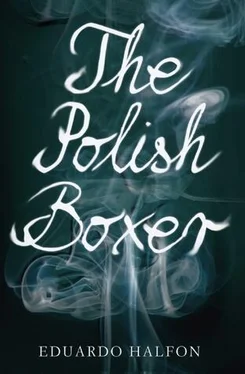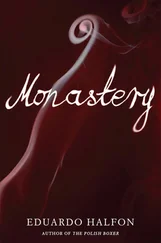Eduardo Halfon - The Polish Boxer
Здесь есть возможность читать онлайн «Eduardo Halfon - The Polish Boxer» весь текст электронной книги совершенно бесплатно (целиком полную версию без сокращений). В некоторых случаях можно слушать аудио, скачать через торрент в формате fb2 и присутствует краткое содержание. Год выпуска: 2012, Издательство: Bellevue Literary Press, Жанр: Современная проза, на английском языке. Описание произведения, (предисловие) а так же отзывы посетителей доступны на портале библиотеки ЛибКат.
- Название:The Polish Boxer
- Автор:
- Издательство:Bellevue Literary Press
- Жанр:
- Год:2012
- ISBN:нет данных
- Рейтинг книги:4 / 5. Голосов: 1
-
Избранное:Добавить в избранное
- Отзывы:
-
Ваша оценка:
- 80
- 1
- 2
- 3
- 4
- 5
The Polish Boxer: краткое содержание, описание и аннотация
Предлагаем к чтению аннотацию, описание, краткое содержание или предисловие (зависит от того, что написал сам автор книги «The Polish Boxer»). Если вы не нашли необходимую информацию о книге — напишите в комментариях, мы постараемся отыскать её.
marks the debut of a major new Latin American voice in English.
The Polish Boxer — читать онлайн бесплатно полную книгу (весь текст) целиком
Ниже представлен текст книги, разбитый по страницам. Система сохранения места последней прочитанной страницы, позволяет с удобством читать онлайн бесплатно книгу «The Polish Boxer», без необходимости каждый раз заново искать на чём Вы остановились. Поставьте закладку, и сможете в любой момент перейти на страницу, на которой закончили чтение.
Интервал:
Закладка:
I thought then, inevitably, of the story of my Polish grandfather in Auschwitz. A story that, until he told it to me, nobody in my family knew. When he arrived in Guatemala after the war, he clammed up completely. He refused to talk about the time he’d spent in the various concentration camps. But a few years ago, six or seven years, perhaps, I somehow dared to ask him if I could interview him. To learn a bit, to find out, to leave some record (not to mention evidence) so that I could perhaps then tell the story myself. And my grandfather, with absolute calm, said sure, gladly. We agreed on the day and the time, and I managed to borrow a video camera. I filmed him talking — for the first time in almost sixty years — about his capture at Łódź while he was playing dominoes with some friends, about the last time he saw his family, about his passage through the various concentration camps, about the Polish boxer who, he told me, saved his life in Auschwitz. And this short, simple story of the Polish boxer seemed powerfully literary to me. It goes something like this. My grandfather is in the Sachsenhausen concentration camp. He accepts the gift from a new prisoner of a twenty-dollar gold coin, which he will use to get more food, more soup. They find him out, beat him, and send him to Block Eleven at Auschwitz, to be shot against the already-infamous Black Wall. That night — the night before being put on trial — he’s thrown into a cell filled with people, and there he meets a Polish boxer. They speak the same language. They’re from the same town. The Polish boxer is still alive because the German soldiers like watching him box, presumably (with a certain amount of license) rather like watching a cockfight. An old, experienced resident of Auschwitz’s Block Eleven, the Polish boxer spends the whole night telling my grandfather what to say and what not to say at his trial the following day. Training him, as it were, with words. And the following day, my grandfather says and doesn’t say what the Polish boxer told him to say and not to say, and this does indeed save him. The end. I liked this story straight away, perhaps for its simplicity or its apparent simplicity, perhaps for what it implies about the use of words for salvation, for our salvation. I already had the reality — I even had it on film. And now I needed to bring it over into literature. But how to recount this reality? From what point of view? From what moment in time? I tried in many different ways, and using many different narrative techniques, until finally, six or seven years after I’d walked away with this story under my arm (as a friend of mine would describe it in his apartment on Conde de Xiquena), I managed to write a piece in which a grandson interviews his grandfather about his experiences in Auschwitz while he’s looking at the five green numbers on his arm and they’re drinking a bottle of whiskey together. And that was it. All done. I had managed to carry reality over into literature. I had managed, through literature, to penetrate reality. All lovely and perfect and smelling of printer’s ink. Until recently. One morning, I opened the Sunday supplement of a Guatemalan newspaper, and even before I’d managed to take my first sip of coffee, I saw a photo of my grandfather on his butter-colored leather sofa, showing those five pale numbers and saying in an interview that he’d been saved in Auschwitz thanks to (I had to read it twice) his skills as a carpenter.
What? A carpenter? What skills as a carpenter? What happened to the Polish boxer, to Scheherazade in disguise?
And that’s it.
Literature is no more than a good trick a magician or a sorcerer might perform, making reality appear whole, creating the illusion that reality is a single unified thing. Or perhaps literature needs to construct one reality by destroying another — something that in a very intuitive sense my grandfather already knew — that is, by destroying and then reconstituting itself from its own debris. Or perhaps literature, as my old friend from Brooklyn used to argue, is no more than the precipitate, zigzagging, rambling discourse of a stutterer.
It was something like this that I was reasoning out and brooding over during that cold, sleepless dawn, just about to understand or at least to find something important, when all of a sudden, now smoking a cigarette in bed, I remembered Ingmar Bergman.
The movie is called Skamme in Swedish, Shame in English, Vergonha in Portuguese. And it’s about the experience of a musician couple who take refuge on an island during the Swedish civil war, but being Bergman, it’s also much more than that. It goes something like this. Having lost everything — their house, their belongings, their marriage, their dignity, even their shame — the couple board a boat full of refugees trying to flee the island and the war. The boat’s engine fails and they are stranded in the middle of the sea. They share the last pieces of bread, the last lumps of sugar, the last drops of water. One man kills himself. The boat gets trapped — in a marvelously horrific image — surrounded by a mass of floating corpses. And in the final scene, the beautiful Liv Ullmann, in a laconic, lost voice that anticipates her death, tells us of a dream she’s had. She says: I had a dream. I was walking down a lovely street. On one side, the houses were white, with large arches and columns. On the other side, there was a shady park. Between the trees ran a brook of dark green water. At last I reached a high wall covered in roses. And a plane passed by and set fire to the roses. But nothing happened, because it was a beautiful image. I looked at the water and saw the reflection of how the roses burned. I was carrying a little girl in my arms. Our daughter. She hugged me close. I could even feel her mouth against my cheek. The whole time I knew there was something I mustn’t forget. Something that somebody had told me. But I forgot it.
That is exactly what literature is like. As we write, we know that there is something very important to be said about reality, that we have this something within reach, just there, so close, on the tip of our tongue, and that we mustn’t forget it. But always, without fail, we do.
Sunsets
My grandfather’s body was a vague shape on the bed. I could see it from the doorway, face-up, rigid, quite small, totally covered by his maroon-and-black-checkered quilt. It was Saturday. He’d died early that Saturday morning while he and my grandmother were sleeping. It was forbidden, until dusk, until the end of the day, to move or to touch this small, vague shape that a few hours earlier had been my grandfather.
I entered the bedroom slowly, trying to detect the smell of death. But it didn’t smell of anything, or it didn’t smell of anything other than the medicines and ointments and the sedentary air that always accompanies the elderly. My grandmother was seated on the far side of the bed — that is, on her side of the bed — with her back to my grandfather’s body. I thought she seemed much more stooped now. Her eyes downcast, she held a bag of ice on her left knee. Facing my grandmother was a fat, bald man with a disheveled red beard, dressed in black except for a cream-colored shirt. He was seated in a chair that clearly didn’t belong in my grandparents’ bedroom and that someone had probably brought in that morning. The man adjusted his skullcap and greeted me with a nod but said nothing, his face set in a permanent grimace. I walked over to him. He got up straightaway and offered me a doughy hand. My condolences, he whispered in poor Spanish and I don’t know why, maybe it was my nerves, maybe it was the huge effort he made to sound solemn, but I let out a small laugh. Solemnity, among strangers, is always farcical. He became even more serious and was about to say something to me or ask something of me, when my grandmother finally looked up. Leibele, she stammered, reaching out for my hand. That’s what she called my grandfather, Leibele, which is León in Yiddish. I crouched down, gave her a kiss and then a hug, and my grandmother held my hand between hers, gripping it tightly, clinging to it as though it were a buoy at sea, it occurred to me then, as I began to feel slightly dizzy and noticed that the bag of ice was about to slip and fall on the carpet. I asked what had happened to her knee. My grandmother tried to say something to me but couldn’t and just managed to purse her lips.
Читать дальшеИнтервал:
Закладка:
Похожие книги на «The Polish Boxer»
Представляем Вашему вниманию похожие книги на «The Polish Boxer» списком для выбора. Мы отобрали схожую по названию и смыслу литературу в надежде предоставить читателям больше вариантов отыскать новые, интересные, ещё непрочитанные произведения.
Обсуждение, отзывы о книге «The Polish Boxer» и просто собственные мнения читателей. Оставьте ваши комментарии, напишите, что Вы думаете о произведении, его смысле или главных героях. Укажите что конкретно понравилось, а что нет, и почему Вы так считаете.












